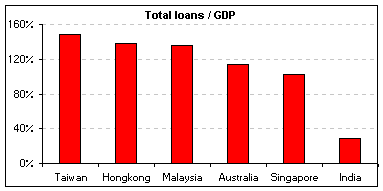It is inevitable! In the Indian banking scenario, consolidation is the next step for evolution.
A look at the international scene suggests that, size does matter. To put things in perspective; State Bank of India is three times the size of Bank of America (BoA). SBI is reaching 90 to 100 million customers while BoA has 30 million customers.
But if you look at assets, BoA has more than a trillion dollar of assets as against SBI's asset size of Rs 4,000 billion. That gives BoA the muscle to cut costs and amplify earnings.
The statistics for total loans to GDP ratio also draws a sorry picture of the Indian banking industry.

As net interest margins get thinner, the need for more sophisticated products and low-cost technology is felt. The only answer to this is to create synergies by consolidating with complimenting entities
To trigger the next phase of consolidation in the banking sector, the Reserve Bank of India is expected to draw a fresh set of guidelines later this month. It is believed that the new draft guidelines will encourage foreign banks to acquire stakes in Indian banks.
The government has clearly indicated that more capital from private and foreign banks is needed to make the banking sector robust.
There are several foreign banks, which are yet to start their operations in India and are looking at strategic alliances to make their presence felt in India.
There are 29 private banks in the country. Of these, around 15 are envisaging to raise resources in the near future. Once the government comes out with clear guidelines, these banks will either go in for IPOs, seek strategic alliances or placements with private equity funds.
It is also expected that most of the profitable private sector banks will fall prey to a takeover bids by their brawny counterparts.
The question now is, which are the possible targets for takeover and what are the likely benefits expected from them? The following analysis seeks to answer this.
| - | J & K Bank | IndusInd Bank | Karur Vyasa Bank | Bank of Rajasthan | Bharat Overseas Bank | |||||
| - | FY03 | FY04 | FY03 | FY04 | FY03 | FY04 | FY03 | FY04 | FY03 | FY04 |
| Advances (Rs m) | 80,109 | 92,849 | 53,478 | 78,122 | 33,444 | 40,232 | 22,212 | 24,316 | 11,531 | 13,915 |
| Deposits (Rs m) | 146,749 | 186,613 | 85,978 | 112,002 | 51,219 | 59,114 | 52,992 | 74,059 | 21,491 | 24,715 |
| Profitability % | - | - | - | - | - | - | - | - | - | - |
| ROA | 2.1 | 2.1 | 0.9 | 2.1 | 2.2 | 2.4 | 1.3 | 1.0 | 1.3 | 1.3 |
| ROE | 31.0 | 28.7 | 15.5 | 37.4 | 25.3 | 25.4 | 26.4 | 22.5 | 21.7 | 22.5 |
| Net Profit / Spread | 64.2 | 65.6 | 48.9 | 82.7 | 73.9 | 54.2 | 37.8 | 36.4 | 47.1 | 41.1 |
| Net Profit margin | 19.7 | 22.3 | 9.0 | 19.7 | 19.3 | 22.3 | 11.4 | 10.2 | 13.5 | 15.2 |
| Quality of Assets % | - | - | - | - | - | - | - | - | - | - |
| CAR | 16.5 | 16.9 | 12.1 | 12.8 | 17.0 | 17.1 | 11.3 | 11.2 | 13.9 | 16.3 |
| NPA / Net Advances | 1.6 | 1.5 | 4.3 | 2.7 | 4.2 | 2.3 | 6.9 | 3.0 | 3.3 | 2.3 |
| Avg cost of deposits | 6.3 | 5.3 | 6.0 | 5.1 | 7.1 | 6.0 | 6.2 | 4.9 | 5.7 | 4.8 |
| Avg yield on advances | 9.1 | 8.0 | 7.4 | 7.9 | 9.1 | 9.8 | 8.6 | 6.9 | 7.7 | 7.6 |
| Productivity (Rs m) | - | - | - | - | - | - | - | - | - | - |
| Income / Branch | 37.7 | 38.3 | 188.8 | 218.2 | 30.3 | 32.3 | 17.8 | 19.2 | 26.8 | 28.7 |
| Income/ Employee | 2.4 | 2.7 | 10.5 | 7.6 | 2.3 | 2.5 | 1.4 | 1.6 | 2.1 | 2.2 |
| Liquidity | - | - | - | - | - | - | - | - | - | - |
| Credit Deposit ratio | 54.6% | 49.8% | 62.2% | 69.8% | 65.3% | 68.1% | 41.9% | 32.8% | 53.7% | 56.3% |
| Borrowings/deposits | 1.5 | 1.6 | 2.8 | 2.1 | 5.2 | 1.8 | 0.3 | 2.4 | 2.6 | 0.7 |
Jammu and Kashmir Bank is the first state owned bank of the country and 53% of equity is held by the government of J&K. The bank has a network of 475 branches spread over the country.
During FY04, the bank recorded a 23% growth in its total revenues over the previous year. Although divestment on the part of the government is uncertain, the performance ratios of the bank surely makes it a good contender for acquisition.
IndusInd Bank also is in the same league with an impressive net worth growth (from Rs 3 billion to Rs 8 billionn) during the past six years. The total deposits and advances of the bank in FY04 grew by 30% and 46%, respectively, faster than the industry growth rate.
t has comparatively smaller branch network of 61 and 80 ATMs across the country. But at the same time, the bank has the highest productivity ratios amongst the Tier II private banks.
The Karur Vysya Bank (one of the oldest private sector banks operating in India since 1916) has been ranked as one of the top five banks in the private sector. The bank has a strong hold in the South with a total of 216 branches across the nation.
The bank has an impressive capital adequacy ratio and also boasts of a credit deposit ratio to the tune of 68%.
Bank of Rajasthan having its network across 12 states, mainly concentrated in the north, has an edge in terms of relatively low cost of deposits. The bank has also successfully cleansed its assets by bringing down the net NPA / advances ratio from 7% in FY03 to 3% in FY04.
Bharat Overseas Bank, a fast growing Chennai based bank is unique in the sense that it is promoted by seven other banks, namely, IOB, Bank of Rajasthan, Vyasa Bank, Karur Vyasa Bank, Federal Bank, South Indian Bank and Karnataka Bank.
Established to take over from Indian Overseas Bank's Bangkok branch, it is one of the few private banks permitted by the Reserve Bank of India to have a branch outside India and is the only bank to represent India in Thailand. The bank has been able to leverage its overseas presence to access low cost deposits and this is reflected in the fact that its borrowings / deposits ratio have declined from 2.6 times in FY03 to 0.7 times in FY04.
Let us clarify that the above five banks are just a few of the contenders of the consolidation process. In the long run, they may or may not be part of the M&A activity. The purpose of the article is only to highlight the facts.
Fundamentally, a merger must satisfy its objectives. There needs to be an increment in market share, augmented scale, reduction in expenses and last but not the least, it has to be attractive to shareholders.
The credibility of the acquiring entity and the complimenting benefit offered by the acquired target will together decide the fortunes of the shareholders.
Equitymaster.com is one of India's premier finance portals. The web site offers a user-friendly portfolio tracker, a weekly buy/sell recommendation service and research reports on India's top companies.








 © 2025
© 2025